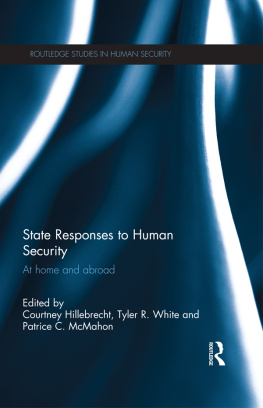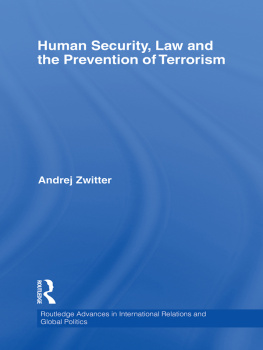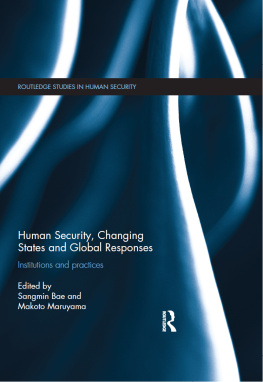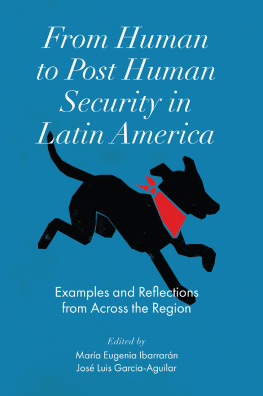State Responses to Human Security
The aim of this book is to analyze why and how states respond to human security, both at home and abroad.
Although states still define security as the defense of territory from military attack, increasingly security pertains to the protection of human beings from violence. This violence can emerge from rebels, drug traffickers, terrorism, and even environmental and demographic changes. While previous literature in this field has provided rich empirical detail about human security crises, it is generally quiet about how states respond to these crises.
State Responses to Human Security fills this lacuna by bringing in concepts from international security studies and focusing on states perceptions of power and the changing nature of human security. Instead of debating whether human security exists, the authors in this volume agree that human security has been redefined to include policies associated with violence toward individuals and groups, and they draw on recent events in the Middle East, China, and Mexico to understand how and when human security issues prompt state responses and affect international relations. The case studies analyzed in this book suggest that states respond to human security threats differently, but in both the domestic context and abroad, power and perceptions matter greatly in shaping states reactions to human security concerns.
This book will be of much interest to students of human security, foreign policy, international relations and security studies in general.
Courtney Hillebrecht is an assistant professor at the University of Nebraska Lincoln and has a PhD from the University of WisconsinMadison (2010).
Tyler R. White is a lecturer in International Politics at the University of NebraskaLincoln.
Patrice C. McMahon is an associate professor at the University of Nebraska Lincoln. She is also the author/editor of three previous books, including, most recently, Statebuilding and the International Community (Routledge, 2012).
State Responses to Human Security
At home and abroad
Edited by
Courtney Hillebrecht,
Tyler R. White
and Patrice C. McMahon
First published 2014
by Routledge
2 Park Square, Milton Park, Abingdon, Oxon, OX14 4RN
and by Routledge
711 Third Avenue, New York, NY 10017
Routledge is an imprint of the Taylor & Francis Group, an informa business
2014 selection and editorial material, Courtney Hillebrecht, Tyler R. White and Patrice McMahon; individual chapters, the contributors.
The right of the editor to be identified as the author of the editorial material, and of the authors for their individual chapters, has been asserted in accordance with sections 77 and 78 of the Copyright, Designs and Patents Act 1988.
All rights reserved. No part of this book may be reprinted or reproduced or utilised in any form or by any electronic, mechanical, or other means, now known or hereafter invented, including photocopying and recording, or in any information storage or retrieval system, without permission in writing from the publishers.
Trademark notice : Product or corporate names may be trademarks or registered trademarks, and are used only for identification and explanation without intent to infringe..
British Library Cataloguing-in-Publication Data
A catalogue record for this book is available from the British Library
Library of Congress Cataloging-in-Publication Data
A catalog record has been requested for this book.
ISBN: 978-0-415-70553-0 (hbk)
ISBN: 978-1-315-88965-8 (ebk)
Typeset in Baskerville
by Apex CoVantage, LLC
Contents
SECTION I
Introduction
COURTNEY HILLEBRECHT AND PATRICE C. MCMAHON
SECTION II
Responses at Home
ANDREW WEDEMAN
AMY FORSTER ROTHBART
GEORGE W. GRAYSON
KAREN ALBERT AND AARON HANSEN
SECTION III
Responses Abroad
PAUL REXTON KAN
DAVID P. FORSYTHE
ERIC A. HEINZE AND HELEN KERWIN
SECTION IV
The Future
L AURA NEACK
GLENN R. PHELPS, PATRICE C. MCMAHON, CYNTHIA ENGLISH, AND GALE MULLER
TYLER R. WHITE
Am I my brother's keeper? This question has echoed over the centuries without a definitive resolution. The question has shifted from the personal to the political dimension and from the internal to the international sphere, inspiring moral and analytical academic consideration. Recently, the development of the much debatedand somewhat vaguely definedResponsibility to Protect (R2P) has added further legal and moral components to the debate. Yet as the scope of security studies has expanded, statements about human security regularly continue to exceed the willingness of states to act on their pronouncements. Understanding the why and the how of this state of affairs is important if we are to move beyond deploring the singular inability of international practice to act according to principle.
After a career that included participation in four wars as a soldier and diplomat and after having experienced terrorism, riots, and repressive governments firsthand, I am particularly aware of how much we still do not know about political violence and its causes. This dearth of knowledge and lack of solutions continues to afflict our world. Therefore, this volume's examination of violence from a crosssectoral perspective and its attempt to analyze why and how states respond to violence against individuals both domestically and abroad is timely.
It is particularly important that the focus of this volume is on states because, for all the development of international organizations and laws and the recognition of the challenge of transnational issues that exceed the powers and limitations of sovereignty, states remain the fundamental building blocks of international affairs. Compulsion and international pressure are possible by nongovernmental groups, licit and illicit, but ultimately the focus of their action is on the behavior of states. Groups focused on issues like human rights and climate change can agitate for change, but it is only when states cooperate that real change takes place. Certainly, states still control the possibility of significant intervention in the behavior of other states when the issues at stake are mass atrocities and repression. It is equally true that other threats to human security, from climate change to child labor, will be addressed successfully only when states take notice and cooperate. That states frequently do not do so and the problems consequently remain unresolved only further testifies to the continuing centrality of the state in international affairs. Thus, the focus on state behavior remains a critical component of analysis.
The perception of power, as much as its actual possession, is a recurring theme in this volume. That too is an approach amply justified by life. Few violent confrontations have been started by those convinced they would lose. Rather, during wars and insurrections, one side tends to find their calculations deficient. Had their perceptions been different, so might have been their choice of policies. Perception matters. The objective correlation of forces, as the former Soviet Union used to define matters, is important, but in human affairs it often emerges that the calculation is more subjective than objective, and it is frequently as important as equipment.













